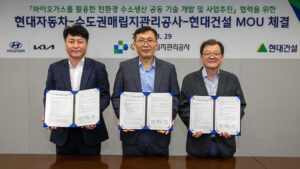Hyundai to harness hydrogen from food waste

The Group signed a memorandum of understanding (MOU) in August at the Hyundai Engineering Construction Co.,Ltd (Hyundai E&C) office in Jongno-gu, Seoul, attended by officials from Hyundai Motor Company, Kia Corporation, Hyundai E&C and the Sudokwon Landfill Site Management Corporation (SL Corp.).
The agreement aims to demonstrate a system that can produce 216 kilograms of green hydrogen per day by utilising biogas produced by the SL Corporation over the next two years.
This is enough to charge more than 34 units of NEXO, Hyundai Motor’s hydrogen fuel cell electric vehicle, according to the Group.
High purity hydrogen production is possible through refinement and reforming processes, it added.
Fermentation of food waste produces biogas, primarily methane. The resource-circulating hydrogen production technology is gaining attention for generating renewable energy sources from waste materials, embodying the ‘waste-to-energy’ concept of hydrogen production.
Under the agreement, Hyundai Motor and Kia will establish an integrated system for the catalytic reaction process, Hyundai E&C will be in charge of developing gas selection separation technology in the hydrogen production process, while the SL Corp. will study biogas pretreatment technology and provide research sites and facilities, including biogas, a raw material for hydrogen production.
The Group plans to promote green hydrogen production capabilities while also researching renewable synthetic fuel (e-fuel) production technologies.
It also plans to secure technologies to apply recycled synthetic fuels that can be obtained additionally in the hydrogen production process to existing internal combustion engine vehicles.
In addition, it plans to take a step closer to achieving its ultimate carbon neutrality goal by developing a technology that synthesises clean hydrogen and carbon monoxide, eventually generating renewable plastic materials.
The SL Corp. expects the agreement to achieve the Nationally Determined Contribution (NDC) and provide conditions to stably secure clean hydrogen needed to implement the 10th Basic Plan on Electricity Demand and Supply.
“Through this agreement, we intend to conduct in-depth research and demonstrate resource-circulating energy technologies to achieve carbon neutrality,” said Seung Hyun Hong, head of materials research and engineering centre at Hyundai Motor and Kia.
“We are committed to leading the industry as a global carbon neutrality leader by developing high value-added technologies, such as e-fuel and renewable plastic interior materials production, in the future."


























